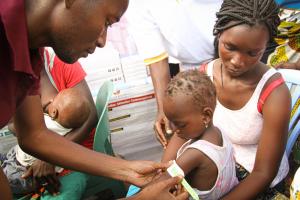The Government of Japan contributes US$ 1 million to UN agencies to support vulnerable populations in Angola
As the consequences of COVID-19 become more tangible, WFP, WHO and UNICEF are working together to protect children and families in Angola from catastrophic levels of deprivation through strengthening essential services, including health, food security, nutrition, hygiene, and education.
LUANDA, 16 March 2021 – The World Food Programme (WFP), World Health Organisation (WHO) and the United Nations Children’s Fund (UNICEF) welcome a contribution of US$ one million from the Government of Japan to support various interventions in Angola.
“With these funds, we confirm the commitment of the Japanese government to contribute to improved living conditions of families in Angola and to the creation of a favourable environment for the integral development of every child, especially those who live in situations of increased vulnerability,” said Maruhashi Jiro, Ambassador of Japan in Angola.
Funding from Japan will allow to implement a package of activities aimed at the promotion of mental health, generating evidence on the prevalence of micronutrient deficiencies, and ensuring that refugees from the Democratic Republic of the Congo in the Lunda Norte province, are able to meet their basic food and nutrition requirements benefiting from food distributions and relevant information on nutrition, health and hygiene.
“In times of the pandemic it is crucial to support vulnerable communities such as refugees, as their nutrition and food security status can be negatively affected by the social and economic consequences of COVID-19, and the Japanese contribution will allow WFP to support 7,000 DRC refugees in Lunda Norte for 2 months,” stressed the Head of WFP Office in Angola, Michele Mussoni. Having supported WFP’s lifesaving assistance to refugees in 2020, Japan continues to be an important partner in Angola ensuring the continuity of operations.
WHO representative reiterated that the COVID-19 pandemic had a considerable impact on the provision of health services and indirectly affected the nutritional status and mental health of the vulnerable populations. “With the funds from the Government of Japan, WHO will support nutrition and mental health programmes at the national level, and assist in the adaptation of norms and protocols for the prevention and treatment of malnutrition and its health consequences while giving priority to populations in vulnerable situations,” said Djamila Cabal.
A portion of the funds will be allocated for activities focusing on water and sanitation, development of communication materials on risks and community engagement for schools, and access to nutrition services for at least 10,000 children under 5 years old, for prevention and management of acute malnutrition.
“With increased efforts UNICEF will continue to work to prevent malnutrition, especially in families with babies and children, address the issue of gender-based violence, make schools safe for children and make health services accessible in order to ensure that children can grow and develop in a healthy environment”, said Ivan Yerovi, UNICEF representative in Angola.
WHO, WFP and UNICEF are working to ensure a unified response and call the attention to the growing problem of malnutrition and food insecurity bringing the international community closer to an integrated response.



